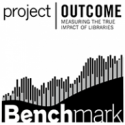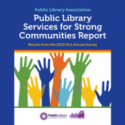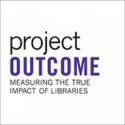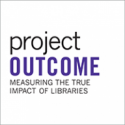Assessment/Evaluation
On-demand webinars are archived recordings of previous PLA webinars available 24/7 for viewing at your convenience.
Click to view all webinars—both live and on-demand—currently available in the ALA eLearning catalog.
Please note: As PLA transitions its webinar content to the new, centralized ALA eLearning site, some older on-demand webinars may be temporarily unavailable for purchase. If you’d like to purchase access to an older on-demand webinar, please contact PLA at plawebinars@ala.org and we will follow up with you when these products are available on the new eLearning site. However, many of PLA’s on-demand webinars are free, each denoted with a green “Free!” icon below the title.

ACRL and PLA staff discuss the data and assessment products, Project Outcome and Benchmark, and how they can help your group, consortia, or state library administrative agency. Libraries across the country use these tools for benchmarking, understanding trends, advocating for better resources, and assessment. Utilizing the group functionalities of these tools will allow you and your group’s member libraries to easily use peer data, standardized measurements, and robust interactive reporting tools to demonstrate the value of library programs and services.

Benchmark: Library Metrics and Trends features interactive data visualizations that allow libraries to easily explore peer comparisons across a wide range of metrics related to library programs, services, and operations. Learn how Benchmark can support your library in everyday decision-making. Get a behind-the-scenes look at Benchmark’s interactive and user-friendly data dashboards and reporting tools for public library subscribers. These feature data from PLA annual surveys, the IMLS Public Libraries Survey, and the Census Bureau’s American Community Survey.

Understand how libraries use their unique programs, services, partnerships, and facilities in support of community needs—now and in the future. This free on-demand webinar provides an overview of results from the Public Library Association's (PLA) 2022 Public Library Services for Strong Communities Survey. Learn how libraries can apply the results to planning and advocacy, and how to engage in PLA's ongoing data initiatives. The 2022 Survey Report is freely and publicly accessible on the PLA website.

PLA is excited to announce a new feature available in Project Outcome for public libraries! Beginning in March 2023, users are able to link their program surveys to the United Nations’ Sustainable Development Goals (SDGs). This on-demand webinar shares how libraries have applied the SDGs. Learn about the SDGs and how your library can leverage Project Outcome to capture and share your library’s impact in its community and the impact of libraries worldwide.

Benchmark: Library Metrics and Trends is the latest evolution in PLA’s data-driven initiatives and tools for libraries. It features a range of interactive data visualizations that allow libraries to easily make peer comparisons across a wide range of metrics related to library programs, services, and operations. Learn how Benchmark can support your library in everyday decision making, such as establishing baselines and identifying opportunities to improve.

A complete count in the 2020 Census is essential to make sure that libraries and their communities don’t miss out on billions of dollars in needed funding, as well as political representation. However, nearly 40% of households have not responded yet, and the count is even lower among populations that have been undercounted historically. Learn how the Census Bureau, libraries, and community partners have adapted their operations and outreach in response to COVID-19, and how libraries can support a complete count before the Census ends in October.

As libraries are expanding their online efforts in response to COVID-19, library and program outcomes should also shift in order to build the strongest and most impactful instruction. In-person opportunities often bring with them advantages of seeing patrons reactions to learning and subsequent micro-improvements that can be made to improve a program. Without “seeing” a full room, presenters are more limited in their ability to understand how participants are responding.

You’ve surveyed your patrons. You’ve collected great data. You’ve learned more about what your patrons value. Now, how can you begin implementing changes based on the outcomes you’ve gathered? In this on-demand webinar, learn how your peers have taken action—and how you can, too—using results you’ve gathered from Project Outcome surveys. Use your survey results to guide programming changes, strategic planning, communication, advocacy, or new funding requests.

Public libraries need more data and evidence to demonstrate their value to their communities, but collecting the data is only half the battle. How do you communicate it? How do you use it to make strategic decisions? Data visualization can help libraries better understand their data and feel confident communicating their impact back to their communities. In this on-demand webinar, attendees learn best practices for how and when to use data visualization, helpful tools for creating visualizations, and how to apply these tips using Project Outcome.

Public libraries are critical to their community’s health, serving as a go-to resource for individuals to access current and reliable health information. Public library staff have a deep understanding of the unique needs of their communities and the value of serving their patrons’ health needs. Now all they need is the data to prove just how valuable those services are. In this on-demand webinar, participants learn how Project Outcome’s new health survey help public libraries measure the success of health programs and services.
